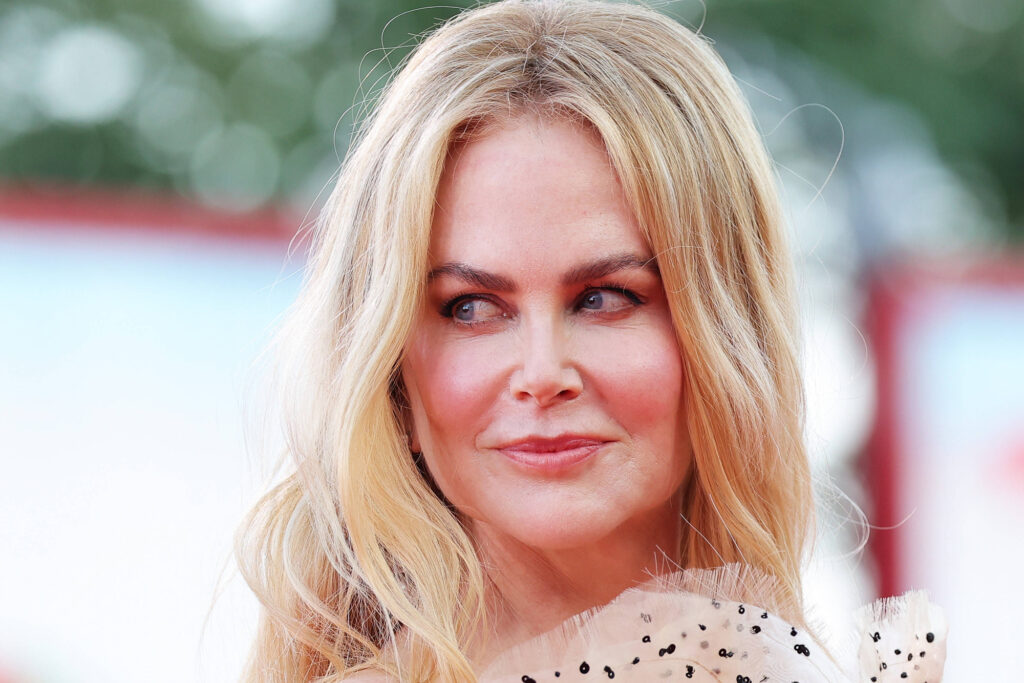- For decades, onscreen age-gap relationships have centered around an older man and his younger female co-star – until now
- 2024 has seen a rise in movies that explore the opposite – including Nicole Kidman’s new film, Babygirl
- Pubity takes a look at this sudden shift, and how the change is beneficial to women everywhere

Age-gap relationships in Hollywood movies are a tale as old as time.
But while the norm for decades has shown a younger woman having a relationship with an older man, the tides appear to be changing – as cinema’s latest obsession appears to be the opposite.
While scenes from The Graduate may spring to mind, there are very few films which depict a reverse scenario.
Even in 2022, Emma Thompson’s movie Good Luck to You, Leo Grande was met with some controversy, as she starred as a middle-aged woman enjoying a relationship with a much younger male sex worker, played by Daryl McCormack.
But 2024 marks a change in the trend – as several movies have already, or are planning to, buck the trend.
2024 sees a switch on age-gap romances in Hollywood
Last week, Gwyneth Paltrow stepped onto the set of her latest movie, Marty Supreme – her first major feature-film appearance since Avengers: Endgame in 2019.
While little is known about the picture so far, it is ‘based loosely’ on the life of ’50s table tennis champion Marty Reisman. The film will be directed by Josh Safdie, who was notably behind the 2019 Adam Sandler film Uncut Gems, and also stars Odessa A’zion, Fran Drescher, Sandra Bernhard, and Tyler the Creator.
But while fans may have been surprised to see the Seven actor, 52, kissing her much younger co-star, 28, in a Central Park tunnel on October 16, Paltrow isn’t alone.
In March this year, 41-year-old Anne Hathway starred in the rom-com The Idea of You opposite Nicholas Galitzine, 30. Just seven months later, Laura Dern’s latest movie saw the 57-year-old actor play Katherine Loewe in Lonely Planet – as a 34-year-old Liam Hemsworth played her love interest.
And on Christmas Day, Nicole Kidman, 57, will return to our screens once more in Babygirl – where she plays a high-powered CEO who puts her career and family at risk when she begins a steamy affair with her much-younger intern, acted by 28-year-old Harris Dickinson.
Women don’t have a ‘use-by date’
While fans are thrilled about the change, on the surface, it does seem somewhat surprising.
But Liz Allen, Australian National University Centre for Future Social Policy Research demographer, says the move is down to ‘women supporting women’.
“Women going through, for example, perimenopause and menopause, are the ones that are funding these projects, these films, these TV series, to enable a greater depiction of women across all ranges,” Allen said.
“That change is being led by women in influential positions with the financial power to back women.
“And I think it’s a grave indictment on us that it’s taken that wave of protest … to allow it, and the fact that we see it as a protest.”
While women of a certain age have previously been erased from love stories such as these – banished instead to just play grandmothers, while their male colleagues of the same age are given the leading roles in rom-coms – this new trend in filmmaking shows that women don’t just disappear when they reach 40, and displays the growing acceptance in popular culture that women don’t have a ‘use-by date’
The stories that have hit our screens this year are also helping to reverse the stereotype of the predatory ‘cougar’, a trope which can be seen in characters such as Stifler’s mom – played by Jennifer Coolidge – in the American Pie franchise.
And part of what makes the tales so appealing is that the men in these movies are in their late twenties or early thirties – unlike the reverse, more common scenario, when the woman is usually in her late teens or early twenties playing opposite a much older male co-star (circling back once again to Laura Dern, who starred as a 23-year-old in Jurassic Park alongside Sam Neill, 43).
Jodi McAlister, senior lecturer in writing and literature at Deakin University, agrees.
“I don’t want to make a sweeping generalization here, but I’m not sure there’s much interest in eroticising ‘the boy’ the way that older men have eroticised ‘the girl’,” she explained. “It’s very clear that these are still men, and they are men that the older woman is not necessarily going to have to mother… he’s an adult.
“But you also have that frisson of the forbidden that comes with dating a younger man, because that’s not what we expect.”